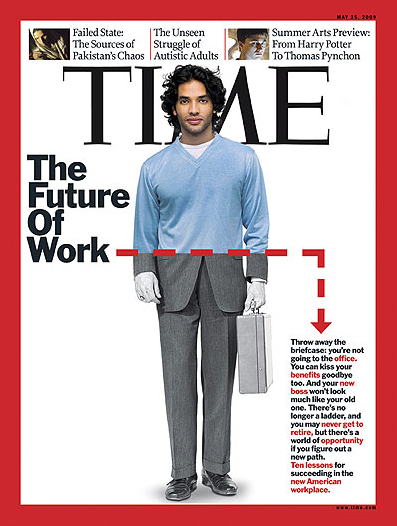
As the latest instance of a major media outlet prescribing mass surrender of even the most limited workplace rights, the cover copy for the May 25, 2009 issue of TIME Magazine reads:
“Throw away the briefcase: you’re not going to the office. You can kiss your benefits goodbye too. And your new boss won’t look much like your old one. There’s no longer a ladder, and you may never get to retire, but there’s a world of opportunity if you figure out a new path.”
The cover image, for its part, gives form to the distasteful idea that a young dope fresh out of college could soon be your boss, not for his wits and skills, but because experience, knowledge, wisdom – the costly corporate ladder, in short – has been pulled out from under everyone climbing it. The young guy – and the boss, for TIME, does indeed seem to be generally male – may not know much about what he’s doing, but he costs less and is cheaper to insure.
What TIME seems to be explicitly endorsing here is the no holds barred, free-for-all, openly oppressive corporate model (or non-model, really) emerging in the wake of the collapse of the already-tenuous, already-insufficient system of benefits, promotion, and reward. TIME may not have anything to say about the mechanisms facilitating the collapse, but they’re happy to describe with pep the new world order and “what this means for you.” Can we really call this journalism, even with the most liberal sense of the term?
Sure, this worldview may now be a reality, but what is so reprehensible aboutTIME‘s description of it is not the world it references, but the carefree manner in which its emergence is taken as an irreversible, and ultimately acceptable, state of affairs. The phrase “kiss your benefits goodbye too” could hardly be more collaborative in spirit, and detached from the full painful effect it engenders. It comes off like it’s no big deal that people will rather suddenly no longer have access to basic medical care. Just adjust and adapt; that’s all.
Furthermore, as anyone who has suffered or survived a mass layoff or company restructuring can attest, these measures are neither necessary nor evenly distributed. Companies are happy to lay off thousands of people, and slash benefits for the rest, before touching the salaries, bonuses, or stock options of the management class, which of course already soak-up an overwhelmingly-disproportionate percentage of company income.
Indeed, the slashing of benefits and further precipitous drop in wages comes as the swift achievement of a long-restrained attempt to permanently crush labor power, to squeeze workers even more than they already were. The financial collapse merely provides the alibi or excuse for implementing a labor arrangement that will persist long past the recovery and which was already in effect well before the “official” September 2008 collapse. The pay gap between executive/management and labor is increasing, not decreasing, and with greater, not lesser, speed.
Just where the “world of opportunity” has been relocated, as TIME insists it has, remains a mystery, but, like Xanadu, we cannot be helped or advised on our journey to “figure out a new path” to this mythical place. And yet, there’s no doubt we’ll continue to encounter, with much greater frequency, vague references to these new paths and alternative means of enrichment, which will have to remain as elusive as they are fictive. The need for this myth is, however, itself a symptom of the strategic refusal to acknowledge the scale with which the labor force is currently being robbed, squeezed, and turned-out for the benefit of a very small group of people. It’s only a matter of time, then, before these upbeat, disillusioned pep talks ring dangerously hollow.